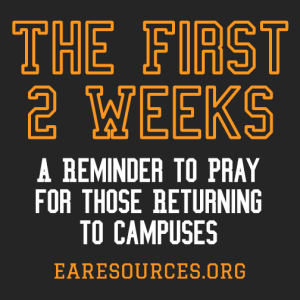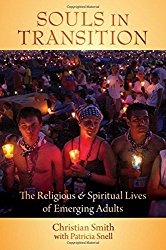
© 2014 Kevin Dooley, Flickr | CC-BY | via Wylio
During the first two weeks of college, your child is facing much bigger issues than getting lost on campus, and running out of clean underwear. Kara Powell and Chap Clark in their book Sticky Faith say, “Over and over, students have told us that the first two weeks at college are when they make key decisions about drinking and other high-risk behaviors, right along with choosing whether to go to church or to a campus ministry.” (Powell and Clark)
In a college setting, social groups are quickly formed often based on where you live, and involvement (sport teams, music groups, or other interest groups). The warm friendly smiles that you receive on campus while visiting, quickly fade as people are no longer looking for more friends. Petrified of being left alone, students often make decisions based on their need for social connection.
Students quickly learn that their decisions about alcohol and other behavior will quickly ostracize them from others. It doesn’t take too many evenings left alone in the dorm before feelings of loneliness can overwhelm even the deepest resolve.
How do you prepare a student for those first two weeks?
1. Teach them to walk across the room and extend a hand. Teaching your child basic skills in how to make new friends is crucial for this new phase of life. Many adolescents face little change in their circle of friends during high school, and have forgotten how to make new friends. Encouraging your adolescent to always be looking for new friends will help them keep their social skills, and prepare them for the future. As a child moves away from home, emerging adults meet their first test, whether than can develop their own community.
2. Teach them how to find a Spiritual Community. Most adolescents have never picked out a church before. They don’t know what questions to ask, or what to look for? Your child might be overwhelmed by the available options, and not try. According to Sticky Faith Research, “40% of students feel prepared to find a new church.” Parents need to prepare their child for find a new Christian community.
Use on-line tools to help your student check out churches around their campus. LiveAbove.com is an outreach of the Youth Transition Network: a coalition of youth, college and military ministries working together to transition students from high school to college/career (For more information about YTN go to www.youthtransitionnetwork.org).
3. Remember last minute cramming, isn’t very helpful. One emerging adult said, “I really appreciated that they didn’t give me a bunch of last minute “advice” about how to live life on my own. I feel like the drop off is not the time or place! If they want to give me life lessons, giving nagging reminders as they drop me off isn’t the best!”
It is not the absence of information that causes students to make poor decisions, it is often the lack of will. The prophet Isaiah makes this point when he says, “Although the Lord gives you the bread of adversity and the water of affliction, your teachers will be hidden no more; with your own eyes you will see them. Whether you turn to the right or to the left, your ears will hear a voice behind you, saying, “This is the way; walk in it.” Even though you are not with them, your child will hear your voice as they are making their own decisions.
 4. Pray, and ask others to join you during this time. Pray for godly influences including: friends, ministries, and other adults. Encourage your church community to do a prayer campaign for college students during the fall as students are leaving for school. Join our prayer campaign.
4. Pray, and ask others to join you during this time. Pray for godly influences including: friends, ministries, and other adults. Encourage your church community to do a prayer campaign for college students during the fall as students are leaving for school. Join our prayer campaign.
Ultimately, you have no control over the first two weeks or any week of your child’s experiences at college. You can only surrender yourself, and your child to the Lord in prayer. This is what makes the first two weeks so very difficult.
Resources
Powell, Kara and Chap Clark. Sticky Faith: Everyday ideas to build lasting faith in your kids.
 Here is a podcast by Steven Argue, who is an expert on emerging adulthood and faith. He is also the parent of three emerging adults.
Here is a podcast by Steven Argue, who is an expert on emerging adulthood and faith. He is also the parent of three emerging adults.









 Research done among youth group participants by Fuller Institute revealed only 12% of mothers have regular dialogue with their children about spiritual or life issues. Only 5% of teenagers reported that their fathers have regular dialogue with them regarding spiritual or life issues.
Research done among youth group participants by Fuller Institute revealed only 12% of mothers have regular dialogue with their children about spiritual or life issues. Only 5% of teenagers reported that their fathers have regular dialogue with them regarding spiritual or life issues.





